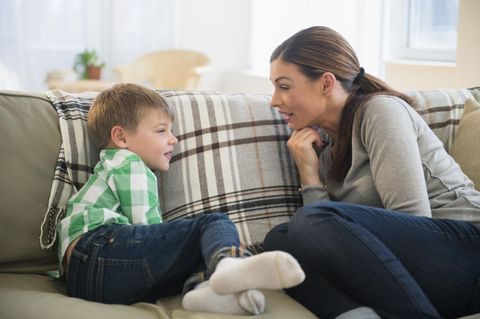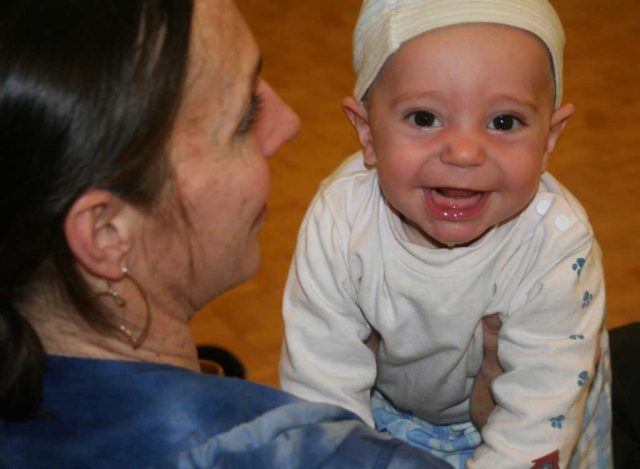March 1, 2020
The most basic and powerful way to connect to another person is to listen. Just listen. Perhaps the most important thing we ever give each other is our attention…. A loving silence often has far more power to heal and to connect than the most well-intentioned words. – Rachel Naomi Remen, M.D.

It’s easy to listen to our kids when things are going well and we have all the time in the world to enjoy each other’s company. But what about when things aren’t so rosy? When we’ve got to get out the door, or when our child is misbehaving in a public setting, or when our child just won’t cooperate. At times like these, it can be hard to listen. When we do take the time to listen, it may offer a profound opportunity to understand our child and handle troublesome situations differently.
One of our students in the LifeWays Fundamentals Course, Jen Walla, faced a similar situation recently, and she agreed to let me share her story.
“We had a really hard situation recently, which still pains me a bit to talk about. A family was coming to interview at my childcare program at the end of the workday, and I’d lined up earlier in the week for my child to go home with his dad that night. Apparently I should have reminded his dad that day, because he didn’ t come. As the family arrived, my child was in his wind-down, usually one-on-one time at the end of the day, and while I’d told him a family was coming to visit, he didn’t understand that my focus needed to be on them at this time. My son was loud, disruptive, unsharing, and refused to listen to my kind but firm requests/mandates for him to be kind, sit with me, share, use toys respectfully, use a quiet voice or play quietly like a little kitten. We stepped into the other room briefly, but it was me talking to him more than listening, and no positive results came of it.
t come. As the family arrived, my child was in his wind-down, usually one-on-one time at the end of the day, and while I’d told him a family was coming to visit, he didn’t understand that my focus needed to be on them at this time. My son was loud, disruptive, unsharing, and refused to listen to my kind but firm requests/mandates for him to be kind, sit with me, share, use toys respectfully, use a quiet voice or play quietly like a little kitten. We stepped into the other room briefly, but it was me talking to him more than listening, and no positive results came of it.
“The family left after getting very little chance to talk and no sense that I could manage with children, and didn’t respond when I sent an apology and some information they’d asked me about. For a couple days, my son talked occasionally about ‘those people that came’ and that he didn’t want them there, that he was loud and disrespectful when they came, and he didn’t want any other kids there. I agreed with him about his behavior and said I wished he would have been more respectful and that I felt disappointed and frustrated. One of the days, I mentioned that I knew he was surprised because he wasn’t expecting it, and that even though I expected his dad there, I should have told him more about what was going on. He really latched onto that. A couple nights later, he talked about it again, and I asked him more about how he felt. He told me he was angry and was trying to make them leave. He told me that he didn’t like people coming over when he didn’t know about it, and that I should have told him. I listened, and just asked him open questions about how things made him feel, what he thought would be a better way for things to go? We made a plan that I would keep him up to date on when anybody was coming over, and to tell him what will happen before they arrive.
“The next morning, I reminded him of our conversation, and of our agreement, and asked if he still thinks it’s a good agreement. He agreed that it is. I then asked if he thinks he can be respectful and show some kids the toys there, and be kind to people if he’s there when they come to visit? He told me, ‘Oh, sure!’ and proceeded to talk about some toys that he’d like to share and things he’d like to show them, and asked when some other kids can come.
“I think I’ve lost that family for my childcare, but if the result of that evening is a better relationship and understanding, cooperation and trust with my child, I feel like it was a great and important success!”
I’d like to point out that Jen’s son is four years old and very articulate. For younger or less articulate children, our “listening” often takes the form of observing the child’s behavior and asking ourselves what that behavior may be able to tell us, in addition to listening to their words. The beauty of Jen’s story is that she didn’t press her son for an answer, or expect him to take part in lengthy conversations. She let him tell her about his experience in his own words, and she was open to listening on more than one occasion as he processed the event.
May you find opportunities to listen this week,

Mary O’Connell, Your Living Arts Weekly blog editor
Nurturing Care
NEW online course begins this Wednesday, March 4th!
Birth to Three- Child development and Care with Rahima Baldwin Dancy

Deepen your understanding of the unfolding experiences and needs of infants and toddlers through this unique online course developed by Rahima Baldwin Dancy. Convenient three week format offers 12 CEUs for teachers and childcare providers.
$99
Learn more about “Birth-to-Three” by clicking here!